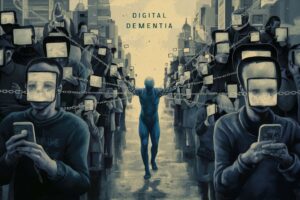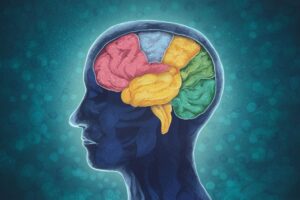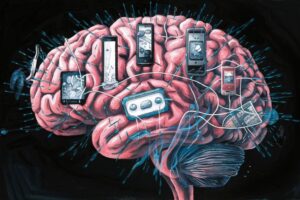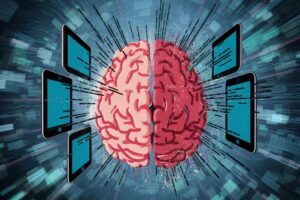Breaking Down the ‘Digital Dementia’ Epidemic: What Science Tells Us!
The digital era has brought about unprecedented advancements in technology that have transformed the way we live, work, and communicate.
However, along with the convenience and connectivity that technology offers, there is a growing concern about its impact on our cognitive health. The phenomenon known as ‘Digital Dementia’ has captured the attention of scientists and healthcare professionals worldwide.
Digital Dementia, a term that has gained prominence in recent years, refers to the cognitive decline and memory problems associated with excessive use of digital devices and technology.
As our society becomes increasingly reliant on smartphones, computers, and other screens, concerns about the impact of technology on our brains have grown, as studies increasingly point to the detrimental effects of excessive screen time on brain function.
By examining the signs, symptoms, and underlying mechanisms of Digital Dementia, we aim to provide insight into this emerging epidemic and offer strategies for prevention and management.
Join us on a journey to explore the science behind Digital Dementia and discover practical solutions for maintaining optimal brain health in the digital age.

Table of Contents
ToggleIntroduction to Digital Dementia
Digital Dementia is a term that refers to the negative impact that extensive use of digital technology can have on cognitive function, particularly memory and concentration.
In today’s digital age, individuals are constantly bombarded with information and stimuli from smartphones, computers, and other digital devices.
This constant exposure to technology can lead to a decline in cognitive abilities, as the brain becomes reliant on external sources of information rather than engaging in critical thinking and problem-solving skills.
This phenomenon is especially concerning for the younger generation, as their brains are still developing and may be more susceptible to the effects of digital dementia.
Research has shown that excessive use of digital devices can lead to a decrease in brain activity, particularly in the areas responsible for memory and attention.
This can result in difficulties with basic cognitive functions such as remembering names, dates, and important tasks. Moreover, the constant multitasking and information overload that comes with using digital technology can hinder the brain’s ability to focus and concentrate on important tasks.
It is crucial to be aware of the potential consequences of digital dementia and take steps to mitigate its effects. This may involve setting limits on screen time, engaging in activities that promote cognitive function, such as reading or puzzles, and practicing mindfulness to improve focus and attention.
Ultimately, it is important to strike a balance between utilizing digital technology for academic and professional purposes, while also taking care to protect and nurture our cognitive abilities for long-term brain health.
Defining Digital Dementia
Digital dementia refers to the cognitive decline that can result from excessive use of technology and digital devices. This phenomenon is characterized by memory problems, decreased attention span, and difficulty with critical thinking and problem-solving skills.
The constant exposure to screens and the limitless access to information through the internet can overwhelm the brain and hinder its natural ability to process and retain information.
In the digital age, where technology is an integral part of daily life, it is essential to strike a balance between utilizing digital tools for productivity and cognitive well-being.
By being mindful of our screen time and engaging in activities that stimulate our brains, such as reading, socializing, and physical exercise, we can prevent and even reverse the effects of digital dementia.
Read more about “How Screen Time Impacts Our Mental Health? Separating Fact from Fiction”
The Rise of Digital Technology in Modern Society
The rise of digital technology in modern society has revolutionized the way people communicate, work, and live their lives. With the advent of smartphones, social media, and the internet, individuals are now more connected than ever before.
This interconnectedness has led to the proliferation of online communities, virtual friendships, and digital collaboration, enabling people to share information and ideas across geographies and time zones.

In addition, digital technology has transformed the way businesses operate, with e-commerce platforms, cloud computing, and artificial intelligence becoming integral to modern industry. As a result, the global economy has become increasingly digitized, with digital technology serving as a driving force behind innovation and growth.
While the rise of digital technology has brought numerous benefits, it has also raised concerns about privacy, security, and digital divide.
The widespread use of social media and online platforms has led to an exponential increase in data collection and surveillance, raising questions about the protection of personal information and privacy rights.
Additionally, the reliance on digital technology has created new security risks, with cyber-attacks and data breaches becoming more prevalent in today’s interconnected world.
Furthermore, the digital divide has widened the gap between those who have access to digital technology and those who do not, leading to disparities in education, employment, and social opportunities.
As such, it is crucial for policymakers, businesses, and individuals to address these challenges and ensure that the benefits of digital technology are equitably distributed across society.
Read more about “The Impact of Excessive Screen Use on Cognitive Abilities: A Closer Look”
The impact of digital dementia on cognitive function
Digital dementia refers to the decline in cognitive function that can result from an overreliance on digital technology such as smartphones, computers, and tablets.
The constant exposure to screens and the ease of accessing information online has been shown to negatively impact memory, attention span, and problem-solving ability.

This phenomenon is especially concerning for younger generations who have grown up with constant digital stimulation, as their brains may become reliant on technology to perform basic cognitive tasks. The effects of digital dementia on cognitive function can be seen in difficulties with concentration, forgetfulness, and decreased critical thinking skills.
Research has shown that the constant bombardment of information and distractions from digital devices can lead to a decrease in grey matter in the brain, particularly in areas responsible for memory and cognitive control.
Additionally, the instant gratification and constant dopamine release from technology use can hinder the development of cognitive skills such as decision-making and emotional regulation.
To combat the impact of digital dementia on cognitive function, it is important to limit screen time, engage in activities that promote cognitive stimulation, and practice mindfulness techniques to improve focus and attention.
By being mindful of our technology use and actively engaging in activities that challenge our cognitive abilities, we can protect our brains from the negative effects of digital dementia and maintain optimal cognitive function.
Read more about “Digital Overload: Exploring the Link Between Screen Time and Memory Loss”
How Digital Overload Affects Memory Function?
Digital overload refers to the constant exposure to digital devices and information that often overwhelms our cognitive abilities, including memory function.
Studies have shown that excessive use of electronic devices such as smartphones, tablets, and computers can impair memory function by overstimulating the brain and reducing its ability to retain and recall information.
The constant multitasking and switching between different tasks while being bombarded with information can lead to cognitive overload, making it difficult to properly encode and store new information in our long-term memory.

Furthermore, digital overload can also negatively impact memory function by reducing our ability to focus and concentrate. With the endless stream of notifications, emails, and social media updates constantly vying for our attention, our ability to sustain attention on a single task or piece of information is compromised.
This constant distraction can interfere with our ability to consolidate new memories and retrieve information from our long-term memory, leading to forgetfulness and difficulty in retaining important details.
In order to improve memory function in the digital age, it is important to establish boundaries and limitations on device use, practice mindfulness techniques to improve focus, and engage in activities that promote cognitive health such as exercise, proper sleep, and a balanced diet.
Causes of Digital Dementia
Digital dementia refers to a condition in which individuals experience a decline in cognitive abilities as a result of excessive use of digital devices.
This modern phenomenon can be attributed to several underlying causes. One primary cause is the onslaught of information overload that individuals face on a daily basis.
With the constant bombardment of digital content from various sources such as social media, news websites, and online forums, individuals may struggle to filter and process this influx of information effectively. This constant stimulation can lead to cognitive overload and mental fatigue, ultimately hindering cognitive function and memory retention.
Another contributing factor to digital dementia is the increased reliance on technology for everyday tasks. With the convenience and efficiency that digital devices offer, individuals may become overly dependent on them to perform basic functions such as remembering appointments, phone numbers, and even simple calculations.
This reliance on technology can lead to a weakening of cognitive skills, as individuals may no longer feel the need to engage in activities that exercise their memory and critical thinking abilities.
Additionally, the addictive nature of digital devices, such as smartphones and tablets, can exacerbate the problem as individuals may spend excessive amounts of time on these devices, further diminishing cognitive function.
Overall, the causes of digital dementia are multifaceted and underscore the importance of finding a balance between technology use and engaging in activities that stimulate cognitive function.
Signs and Symptoms of Digital Dementia
Digital Dementia is a term used to describe a condition that stems from overuse of digital technology, resulting in a decline in cognitive function.
The signs and symptoms of Digital Dementia can vary from person to person, but there are some common indicators to look out for. One of the most obvious signs is memory problems, such as difficulty in remembering basic information or regularly misplacing items.
Another common symptom is a decreased ability to focus and concentrate, with individuals finding it challenging to stay on task or complete complex cognitive tasks.
Additionally, individuals may experience a decline in problem-solving skills and decision-making abilities, leading to difficulties in managing daily tasks effectively.

To recognize signs and symptoms of Digital Dementia, it is essential to pay attention to changes in behavior and cognitive function. For example, if an individual suddenly starts to struggle with basic tasks that were once easy for them, it may be a warning sign of Digital Dementia.
Other signs to watch out for include increased reliance on digital devices for simple tasks, difficulty in processing information, and decreased social interaction.
It is crucial to address these symptoms early on to prevent further cognitive decline and potentially reverse the effects of Digital Dementia through lifestyle changes, such as reducing screen time, engaging in mental exercises, and maintaining a healthy balance between digital technology and real-world activities.
By recognizing these signs and taking proactive steps to improve cognitive health, individuals can reclaim their mental faculties and prevent the negative effects of Digital Dementia.
How digital dementia affects memory?
Digital dementia, a term coined by neuroscientist Manfred Spitzer, refers to the cognitive decline in memory and other cognitive functions due to excessive use of digital devices.
In today’s digital age, individuals are constantly bombarded with information and stimuli from various screens, leading to decreased focus and memory retention.
Research has shown that excessive use of digital devices can impair the brain’s ability to process and retain information, resulting in the deterioration of cognitive functions over time.
This phenomenon has become increasingly prevalent among younger generations who have grown up with constant access to technology, making them more vulnerable to the effects of digital dementia.
Furthermore, the constant use of digital devices has been shown to impact the way information is stored in the brain. Instead of actively engaging in activities that stimulate memory and cognitive function, individuals rely on external sources such as search engines and digital devices to store and access information.
This reliance on external sources leads to a decline in cognitive abilities and memory as the brain loses its capacity to process and retain information effectively.
As a result, individuals may experience difficulty recalling information, organizing thoughts, and focusing on tasks, ultimately leading to a decline in overall cognitive abilities.
In order to combat the effects of digital dementia, it is important for individuals to engage in activities that stimulate the brain, such as reading, problem-solving, and social interactions, in order to maintain cognitive function and memory retention.
The Role of Digital Devices in Cognitive Decline
There is growing concern in the scientific community about the potential role of digital devices in contributing to cognitive decline.
With the increasing reliance on smartphones, tablets, and computers in everyday life, researchers are investigating the impact of excessive screen time on cognitive function.
Studies have shown that prolonged use of digital devices can lead to reduced attention span, memory problems, and decreased cognitive abilities.
This is particularly concerning for individuals who are already at risk for cognitive decline, such as older adults or those with neurodegenerative diseases.

One possible explanation for the negative effects of digital devices on cognitive function is the constant stimulation and multitasking that comes with using these devices.
The brain is constantly bombarded with information when using digital devices, which can overwhelm cognitive resources and lead to cognitive overload.
Additionally, the sedentary lifestyle that often accompanies prolonged screen time can contribute to overall cognitive decline.
To address this issue, it is important for individuals to implement strategies to reduce screen time, engage in cognitive-stimulating activities, and maintain a healthy lifestyle to preserve cognitive function in the long term.
The role of technology in contributing to digital dementia
Digital dementia is a relatively new concept that refers to the decline in cognitive functioning experienced by individuals who rely heavily on technology for tasks that were previously performed mentally. Technology has undoubtedly revolutionized the way we live, work, and communicate, but it also comes with its own set of drawbacks.
Constantly relying on digital devices for basic tasks such as remembering phone numbers, schedules, and directions can lead to a decrease in cognitive abilities such as memory, attention span, and critical thinking skills.
This phenomenon is especially prevalent among younger generations who have grown up in the digital age and are more susceptible to the negative effects of excessive screen time.
One of the main reasons technology contributes to digital dementia is its impact on our brain’s ability to retain information. By outsourcing our memory to smartphones, computers, and other devices, we are less likely to engage in the mental exercise required to retain information and build strong neural connections.
Additionally, the constant bombardment of information from various sources can lead to cognitive overload, making it difficult for our brains to process and retain information effectively.
To combat digital dementia, it is essential to find a balance between using technology as a tool to enhance our lives and relying on our own cognitive abilities to perform tasks that require critical thinking and problem-solving skills.
By incorporating activities that stimulate our brains, such as reading, puzzles, and social interactions, we can maintain our cognitive function and prevent the negative effects of excessive screen time.
Biochemical and Neurological Effects of Excessive Screen Time
Excessive screen time has been linked to a variety of biochemical and neurological effects on the brain. It has been found that prolonged exposure to screens, such as smartphones, tablets, and computers, can lead to an increase in cortisol levels, which is the body’s primary stress hormone.
This can have a negative impact on the brain’s ability to regulate emotions, leading to symptoms of anxiety and depression. Additionally, excessive screen time can disrupt the brain’s natural sleep-wake cycle, as the blue light emitted from screens can inhibit the production of melatonin, a hormone that regulates sleep. This disruption can result in poor sleep quality and a variety of cognitive impairments.
Furthermore, excessive screen time has been shown to impair cognitive functions such as attention, memory, and executive functioning.
Research has found that individuals who spend excessive amounts of time in front of screens have decreased grey matter density in areas of the brain responsible for decision-making and self-control.
This can lead to difficulties in decision-making and impulse control. Additionally, excessive screen time has been linked to a decrease in the release of dopamine, a neurotransmitter that plays a key role in the brain’s reward system.
This can result in an increased risk of developing addictive behaviors and a decreased ability to experience pleasure from everyday activities.
In short, it is important for individuals to be mindful of their screen time usage and to take steps to limit excessive exposure in order to protect their brain health and overall well-being.
Research findings on the link between screen time and cognition!
A growing body of research has been conducted in recent years to investigate the potential impact of excessive screen time on cognitive functioning.
The findings of these studies suggest that prolonged use of screens, such as smartphones, tablets, and computers, may have negative effects on various aspects of cognition, including attention, memory, and problem-solving skills.
For example, a study published in the Journal of Experimental Psychology found that heavy users of digital media performed worse on cognitive tasks compared to light users. This suggests that excessive screen time may lead to decreased cognitive functioning.
Furthermore, research has also shown that screen time can have long-term effects on cognitive development, particularly in children and adolescents.
A study published in JAMA Pediatrics found that higher levels of screen time were associated with lower scores on cognitive tests in children, suggesting that excessive use of screens may have a detrimental impact on cognitive abilities.
These findings highlight the importance of limiting screen time and promoting other activities that support cognitive development, such as reading, physical exercise, and social interaction.
Overall, the research findings on the link between screen time and cognitive functioning emphasize the need for further investigation and awareness of the potential risks associated with excessive screen use.
Tips for reducing digital dementia risk in daily life!
As technology continues to advance at a rapid pace, the risk of digital dementia is becoming more prevalent in our daily lives. To reduce the risk of digital dementia, it is important to implement strategies to protect our cognitive health. One tip is to limit screen time and take regular breaks from digital devices.
This can help prevent mental fatigue and promote brain health by giving our brains time to rest and recharge. Additionally, engaging in activities that stimulate cognitive function, such as reading, puzzles, and social interactions, can help improve memory, focus, and overall brain health.
Another tip for reducing digital dementia risk is to practice mindfulness and mindfulness meditation. Mindfulness involves paying close attention to the present moment without judgment, which can help reduce stress, improve focus, and enhance cognitive function.
By incorporating mindfulness practices into our daily routine, we can increase our awareness of how much time we spend on digital devices and make intentional choices to limit our usage.
Additionally, practicing mindfulness can help improve our overall well-being by promoting mental clarity, emotional resilience, and a greater sense of calm.
Overall, by implementing these tips and making conscious efforts to protect our cognitive health, we can reduce the risk of digital dementia and promote long-term brain function.
Importance of balancing technology use with brain-boosting activities
In today’s digital era, technology has become a vital aspect of our daily routines. While technology provides numerous benefits and conveniences, it is important to strike a balance between technology use and brain-boosting activities to maintain optimal cognitive function.
To achieve this balance, it is essential to incorporate activities such as reading, exercise, mindfulness practices, and social interactions into our daily routine. These activities not only stimulate the brain but also help improve cognitive abilities such as memory, attention, and problem-solving skills.
Engaging in brain-boosting activities can help counteract the negative effects of excessive technology use, such as decreased attention span, memory problems, and reduced social interactions. By setting aside dedicated time for activities that promote brain health, we can improve our overall cognitive function and mental well-being.
Additionally, practicing mindfulness and being present in the moment can help reduce stress and improve focus, which in turn can enhance our ability to learn and retain information.
By finding a healthy balance between technology use and brain-boosting activities, we can support our cognitive health and maintain a sharp mind in today’s fast-paced, technology-driven world.
Healthy Technology Habits and Screen Time Guidelines
In today’s digitally driven world, it has become increasingly important to establish healthy technology habits and screen time guidelines to maintain overall well-being.
Excessive screen time, whether on smartphones, computers, or tablets, has been linked to a variety of negative health effects, including eye strain, poor posture, and disrupted sleep patterns.
Therefore, it is crucial for individuals to set boundaries and limitations on their screen time usage to prevent these adverse consequences. This can be achieved by implementing practices such as taking regular breaks from screens, reducing screen brightness, and using blue light filters to safeguard eye health.
Furthermore, it is essential to be mindful of the content being consumed during screen time, as prolonged exposure to negative or harmful information can have a detrimental impact on mental health.
By prioritizing quality over quantity when it comes to screen time, individuals can cultivate a more positive and enriching digital experience. Additionally, incorporating other activities into one’s daily routine, such as exercise, socializing, and spending time outdoors, can help balance screen time and promote overall well-being.
By adopting healthy technology habits and adhering to screen time guidelines, individuals can better manage their digital lifestyle and ensure a harmonious relationship between technology and wellness.
Embracing Cognitive Fitness and Mental Stimulation
Maintaining cognitive fitness and mental stimulation is crucial for overall well-being and cognitive health. There are several strategies that one can implement in order to embrace cognitive fitness and mental stimulation.
Engaging in regular mental exercises, such as puzzles, reading, and learning new skills, can help to keep the mind sharp and improve cognitive function.
Additionally, physical exercise has been shown to have positive effects on brain health, so incorporating regular physical activity into one’s routine is also important for maintaining cognitive fitness. Adopting a healthy diet rich in fruits, vegetables, and omega-3 fatty acids can also support brain health and cognitive function.
Furthermore, staying socially active and maintaining strong social connections can also help to stimulate the brain and improve cognitive health. Engaging in meaningful conversations, participating in social activities, and building relationships with others can provide mental stimulation and support overall cognitive fitness.
Additionally, practicing mindfulness and stress management techniques, such as meditation and deep breathing exercises, can help to reduce stress and improve cognitive function. Overall, embracing cognitive fitness and mental stimulation requires a holistic approach that encompasses physical, mental, and social well-being.
By incorporating these strategies into one’s daily routine, individuals can support their cognitive health and maintain mental acuity as they age.
Strategies for improving cognitive health and preventing digital dementia!
Maintaining cognitive health is essential for overall well-being because it involves the capacity to think, comprehend, learn, and recall information.
To enhance cognitive health and prevent digital dementia, individuals can engage in a variety of activities that stimulate the brain and promote mental agility. Physical exercise has been shown to have a positive impact on cognitive function, as it increases blood flow to the brain and facilitates the growth of new brain cells.
Furthermore, engaging in activities that require problem-solving, critical thinking, and memory recall, such as puzzles, reading, and learning a new skill, can also help to maintain cognitive health.
In addition to engaging in brain-stimulating activities, it is crucial to prioritize sleep and stress management in order to prevent digital dementia. Lack of sleep has been linked to cognitive decline and impaired memory, so ensuring adequate rest each night is essential for maintaining cognitive function.
Similarly, chronic stress can have detrimental effects on the brain, leading to cognitive deficits over time. By incorporating relaxation techniques such as meditation, yoga, or deep breathing exercises into daily routines, individuals can reduce stress levels and protect their cognitive health.
Overall, by adopting a holistic approach that includes physical activity, mental stimulation, adequate sleep, and stress management, individuals can improve cognitive health and reduce the risk of digital dementia.
Taking steps to protect your brain from digital dementia
In today’s digital age, it is becoming increasingly important to take steps to protect our brains from the potential negative effects of excessive screen time and digital exposure.
The term “digital dementia” refers to a decline in cognitive function due to the overuse of digital devices and the reliance on technology to perform tasks that could otherwise be done through memory and critical thinking.
Research has shown that excessive screen time can lead to reduced attention span, memory problems, and decreased problem-solving skills. To combat these effects, it is essential to implement strategies to protect our brains from digital dementia.
One way to protect our brains from digital dementia is to limit our screen time and take regular breaks from digital devices. Setting boundaries for when and how long we use digital devices can help reduce the risk of cognitive decline.
Engaging in activities that promote cognitive function, such as reading, solving puzzles, and socializing with others, can also help keep our brains sharp and healthy.
Additionally, incorporating mindfulness practices, such as meditation and deep breathing exercises, can help reduce stress and improve focus and concentration.
By taking proactive steps to protect our brains from digital dementia, we can maintain our cognitive function and overall well-being in the digital age.
The future outlook for addressing the digital dementia epidemic
As we continue to advance in the digital age, the issue of digital dementia is becoming more prevalent and concerning. The overuse of digital devices and technology has been linked to decreased cognitive function, memory loss, and poor attention span in individuals. However, as awareness of this epidemic grows, so does the potential for finding solutions and strategies to address it.
In the future, it is crucial for researchers, educators, and policymakers to work together to combat the digital dementia epidemic. This may involve implementing educational programs and initiatives to promote digital literacy and responsible technology use from a young age.
Additionally, advancements in technology itself, such as the development of apps and devices designed to improve cognitive function and memory retention, could also play a vital role in addressing this issue.
By taking a proactive and holistic approach to addressing digital dementia, we can work towards a future where individuals are able to harness the benefits of technology without sacrificing their cognitive health.
Conclusion:
In conclusion, the issue of Digital Dementia serves as a poignant reminder of the importance of maintaining a healthy balance in our relationship with technology.
By understanding the factors contributing to cognitive decline in the digital age and implementing proactive measures to protect our brain health, we can navigate the digital landscape with greater awareness and mindfulness.
Let us embrace the potential for technology to enhance our lives while also safeguarding our cognitive function for a brighter and more sustainable future.
FREQUENTLY ASKED QUESTIONS
1. What is digital dementia?
Digital dementia refers to the decline in cognitive abilities, including memory, attention, and cognitive skills, caused by excessive reliance on digital devices such as smartphones, tablets, and computers. This phenomenon occurs due to the overuse of technology, which leads to changes in brain function and neural pathways.
2. Who is most at risk of developing digital dementia?
Digital dementia can affect individuals of all ages, but younger generations are particularly vulnerable. Developing brains can be more susceptible to the negative impact of excessive screen time and reliance on digital devices. However, adults who spend a significant amount of time engaging in digital activities are also at risk of experiencing cognitive decline.
3. Can digital dementia be prevented?
While complete prevention may not be possible, adopting healthy technology habits can help mitigate the risk of digital dementia. This includes setting limits on technology usage, incorporating regular physical activity and mental stimulation, practicing mindfulness and digital detox, and maintaining a balanced lifestyle that includes social interaction and offline pursuits.
4. Are there any positive aspects to using digital devices?
Yes, digital devices offer numerous benefits, such as easy access to information, communication, and enhanced productivity. When used responsibly and in moderation, digital devices can be valuable tools. It is important to strike a balance between utilizing these devices for their advantages while also prioritizing brain health and minimizing the negative effects of excessive screen time.


